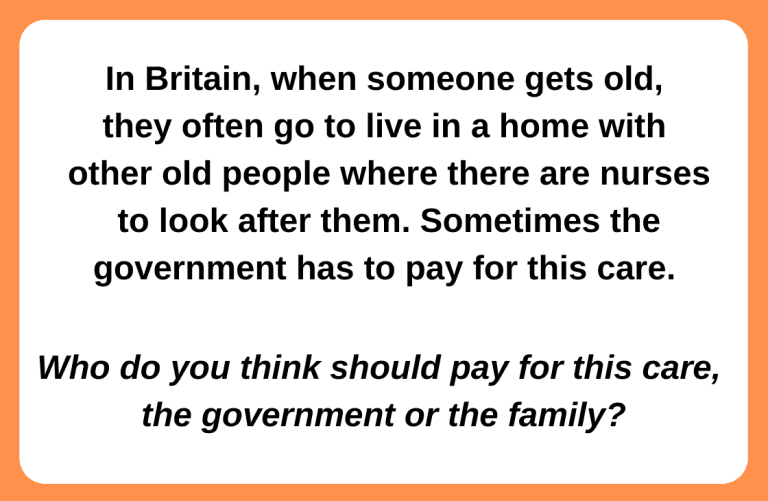Examiner Comments
Fully addresses all parts of the task with a clear position throughout.
Presents well-developed arguments on both sides (families vs. government) before clearly supporting the government’s role.
Uses relevant examples (taxation, income differences) to extend arguments logically.
Ideas are organised logically: introduction → opposing view → writer’s view → conclusion.
Clear progression of ideas with seamless paragraphing.
Cohesive devices (“nevertheless,” “a further justification,” “in contrast”) are varied and natural, without mechanical overuse.
Wide range of precise academic vocabulary: financial responsibility, moral obligation, pressing social needs, inequalities, compelling reason, fairness and dignity.
Word choice is sophisticated and entirely appropriate to the formal context.
Collocations are natural (“shoulder the costs,” “bear the burden,” “equal access”).
Complex sentence structures used flexibly and accurately (relative clauses, concessive clauses, conditionals).
Error-free sentences throughout.
Good balance between longer complex sentences and shorter emphatic ones.
Useful Vocabulary
Places where elderly people live and receive care and support from trained staff, often including medical assistance.
As people in Britain reach old age, many move into residential homes where professional nurses provide round-the-clock support.
Continuous care and assistance provided 24 hours a day.
As people in Britain reach old age, many move into residential homes where professional nurses provide round-the-clock support.
Expensive; requiring a large amount of money.
Since such care can be costly, there is an ongoing debate about whether the financial responsibility should fall on the government or on the individual’s family.
A discussion or argument that continues over a period of time without a final resolution.
Since such care can be costly, there is an ongoing debate about whether the financial responsibility should fall on the government or on the individual’s family.
The government and its institutions, representing public authority.
In my view, the state should bear the primary burden of funding elderly care, as this ensures fairness and equal access regardless of a family’s financial situation.
To take on the main responsibility for something, especially when it is difficult or demanding.
In my view, the state should bear the primary burden of funding elderly care, as this ensures fairness and equal access regardless of a family’s financial situation.
Guarantees or makes certain that something will happen.
In my view, the state should bear the primary burden of funding elderly care, as this ensures fairness and equal access regardless of a family’s financial situation.
To take responsibility for paying expenses.
One argument is that families themselves should shoulder the costs of elderly care.
A duty to act in a certain way because it is considered the right thing to do.
From this perspective, adult children have a moral obligation to look after the parents who once raised and supported them.
Made responsible for something, especially for actions or decisions.
Moreover, advocates of this view claim that if families are held accountable, government resources can be directed towards other pressing social needs such as education or healthcare for younger generations.
Important and urgent issues in society that require attention or resources.
Moreover, advocates of this view claim that if families are held accountable, government resources can be directed towards other pressing social needs such as education or healthcare for younger generations.
Does not deal with or solve a particular problem.
Nevertheless, while this position highlights personal responsibility, it fails to address the inequalities that arise when some families cannot afford to pay.
A strong and convincing argument in favour of something.
A compelling reason why the government should pay for elderly care is that older citizens have already contributed to society through decades of taxation.
Many years of paying taxes to the government.
… older citizens have already contributed to society through decades of taxation.
Compulsory payments by workers in the UK that go to the government to fund public services.
For instance, someone who has spent forty years in the workforce will have consistently paid income tax and national insurance, which fund public services.
Provide money to support government-run systems such as healthcare, education, and
transport.
For instance, someone who has spent forty years in the workforce will have consistently paid income tax and national insurance, which fund public services.
An additional reason given in support of an argument.
A further justification is that government funding guarantees equal access to professional support, regardless of a family’s income.
A relatively small amount of money that someone has set aside.
Without such funding, a retired teacher with modest savings might be forced into a lower-quality facility…
High-quality and often more expensive services.
…while a wealthy business owner could afford premium care.
The quality of being just and treating people equally, while also respecting their worth.
By covering the costs centrally, the government ensures fairness and dignity for all elderly people.
In the strongest or most suitable position to take on the main responsibility.
For these reasons, the state is best placed to bear the primary burden of providing residential care for the elderly.






